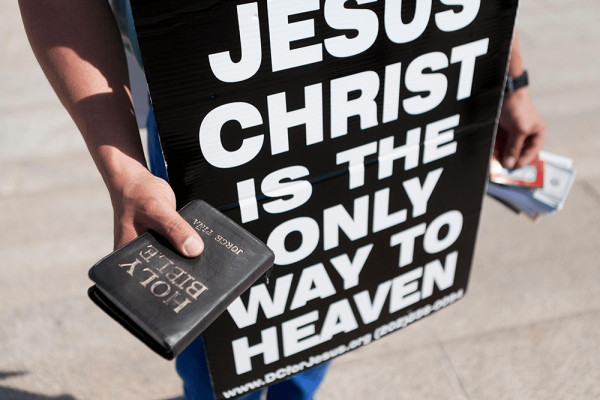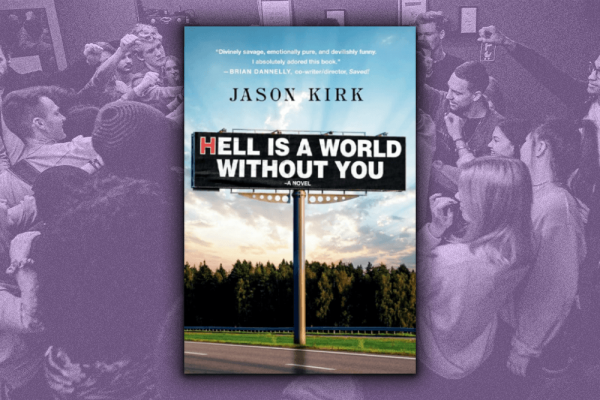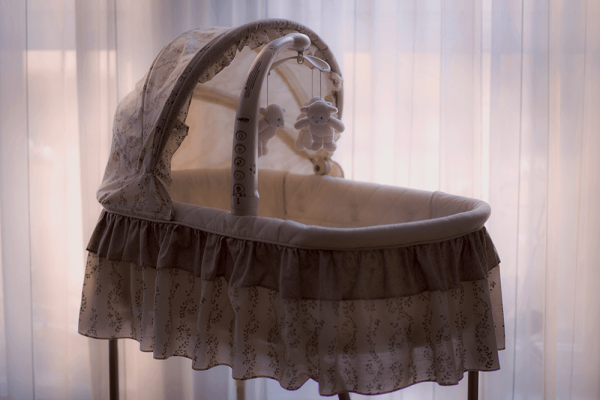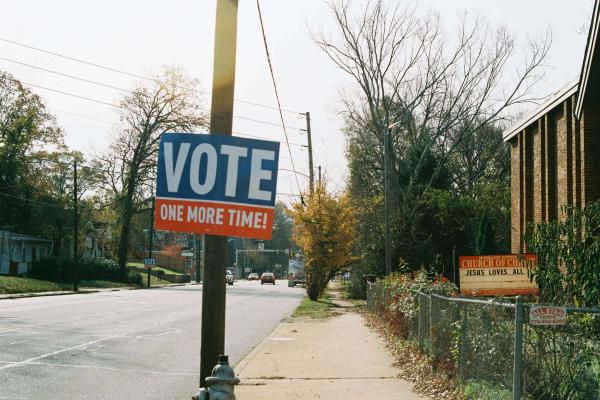“Eating is an inherently good activity,” writes Elizabeth Palmberg in the 2009 issue of Sojourners, “a channel of God’s goodness.” Eating is also an essential way for us to experience fellowship, build relationships, and share love. Yet eating can also be, as the Apostle Paul writes, an extension of our faithfulness: “So whether you eat or drink or whatever you do, do it all for the glory of God” (I Corinthians 10:31). And when I think about my diet, it’s hard to imagine how the overconsumption of meat — which so often exacerbates health problems and disproportionately contributes to climate change — can be to the “glory of God.”
The new documentary God & Country, inspired by Katherine Stewart’s book The Power Worshippers, fortunately escapes most of the major pitfalls of political documentaries as it addresses the rise of Christian nationalism.
Was Robert E. Lee, the infamous confederate general who went to war to defend slaveocracy in the South, a Christian? The answer to this question may seem obvious: Yes. Lee was an Episcopalian who was called a “humble, earnest Christian” by a minister who was his contemporary. But some Christians may recoil at the idea that someone they see as clearly at odds with Jesus’ call to “release the captives,” would be considered a Christian.
I don’t think I’ve ever read a book quite like Jason Kirk’s Hell Is a World Without You. This book, a bildungsroman about a teen’s evangelical house of cards and the mounting life experiences, new friends, and cold fingers of doubt that threaten to knock it over, is a call coming from firmly inside the house.
The greatest single line in cinema of the past 12 months was delivered inside of a Barbie Dreamhouse.
Every morning, I drive my two sons, ages 11 and 13, to school. Normally these rides are mostly quiet as I listen to podcasts, and they watch something on their iPads. But this February, I told my sons we were starting a new tradition: Taking turns naming a figure of Black history and sharing why we believe that person was significant. To my surprise, my sons’ initial reticence quickly turned to enthusiasm. So far, we’ve talked about Louis Armstrong, Jesse Owens, Sojourner Truth, Thurgood Marshall, Rosa Parks, and Carter G. Woodson — the leader of the Association for the Study of Negro Life and History who established the second week of February to be “Negro History Week” to counterbalance the ongoing erasure of Black contributions in the U.S.
In a country where religious leaders openly condemn homosexuality and gay sex is punishable with jail time, Ghanaian couple Kay and Naa Shika fear more for their lives and safety than whether a church will bless their same-sex union.
When Pope Francis called for a global ban on surrogacy during a foreign policy address last month, non-Catholics, especially those in the United States, may have felt the subject came out of nowhere. Surrogacy is medically and legally regulated in the U.S. as an intervention recommended by the American Society for Reproductive Medicine for those who do not have the ability to become pregnant or carry a pregnancy to term. But the pope’s concern was beyond the ethics of procreation, as he positioned his pronouncement within the context of a global economy and exploitation of women.
“A child is always a gift and never the basis of a commercial contract,” Francis said. “At every moment of its existence, human life must be preserved and defended; yet I note with regret, especially in the West, the continued spread of a culture of death, which in the name of a false compassion discards children, the elderly and the sick.”
It’s an election year again, and so far it sees that President Joe Biden and former President Donald J. Trump will again be on the ballot for the White House in 2024. For many churches, that means a repeat of 2020’s division, misinformation, and difficult decisions about corporate worship.
Buckle up.
We have been on this ride before, but that doesn’t mean it will be any easier.
I love documentaries. I try to watch a minimum of one per week. I am especially drawn to documentaries like Born in Synanon — a documentary about a rehab community that eventually became a cult — because it wrestles with questions around race and religion. These two subjects are endlessly fascinating to me.
So, when I heard about Faith in Blackness, I knew I would have to see it. In October 2023, one of the executive producers, Josué Perea, invited me to a screening at the University of Washington. The documentary explores the relationship between AfroLatine spirituality and how that spirituality shapes a person’s identity and understanding of the divine.









